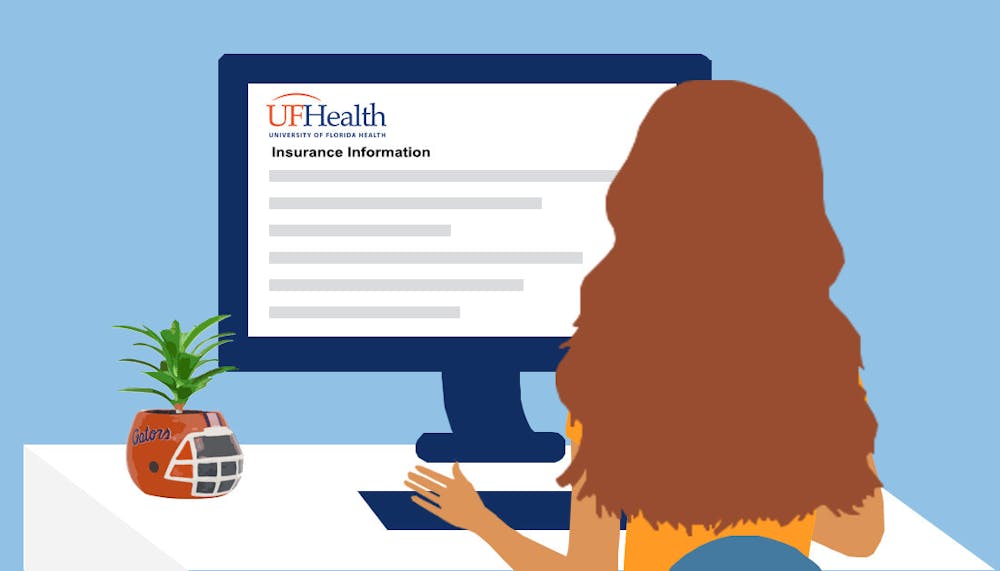If a UF student is not already enrolled in a health care plan, the university automatically charges upward of $1,000 for its own health insurance option.
At the beginning of each semester, most students see a charge on ONE.UF for the university’s health insurance plan. The charge can be waived if a student proves they already have insurance, whether it’s under a parents’ plan or a plan of their own. Some students opt for the university’s provided plan.
Maria Gomez, a 21-year-old UF psychology senior, was happy to learn UF health insurance covered visits to a psychiatrist and her allergy medication.
“It's very convenient just because I don't have to do all the process of looking for insurance outside of the school and because I don't have to submit any type of paperwork … every time the semester starts,” Gomez said. “[But] they’re not very clear on what they cover, and it is very hard to find what you can get out of the insurance.”
The student insurance plan covers preventative care, urgent care, hospital and emergency room stays, mental health care, and pediatric and vision up through age 19. For those 20 and older, the plan covers one dental exam per policy year and one eye exam up to $100 per policy year. The plan does not cover cosmetic surgery, hearing aids, experimental drugs, growth hormones, sleep disorders or injuries sustained in college or professional sports.
The maximum amount students can expect to pay when using the UF health insurance is $6,350 per policy year. After that, the plan pays all additional costs. The annual deductible — the amount a customer has to pay before the plan begins covering medical expenses — is $200.
Copays, or the amount the plan does not pay, include $25 for every office visit or lab exam; $100 for every emergency room visit; and $20, $30 or $50 for prescription drugs depending on the medication. Birth control pills are free.
For Gomez, whose parents live in Colombia, depending on a parental insurance plan was not an option. When she transferred from Florida SouthWestern State College to UF in her sophomore year, the health insurance mandate pressed her into making a decision.
Gomez feels it is easy for UF to take advantage of students who sign up for the university-provided plan because they’re often the ones who know the least about insurance.
“It’s very easy to be covered by it … they just do it if you don’t have any other type of insurance,” Gomez said. “In my opinion, it kind of takes advantage of the fact that, most of the times, students that do end up with that insurance don't really know anything about insurance.”
While some students opt into the plan because it seems easy and affordable, others search for better options.
Siddhesh Patil, a 23-year-old UF computer science graduate student, is from India, where there is government-provided health care. UF’s health insurance requirement was surprising, but after researching his options, he decided Professional Service, Inc’s (PSI) Presidential plan was right for him.
As an international student, Patil considers costs as a main factor when settling on an insurance plan.
“PSI is offering me the same stuff as UF Health, but at a lower cost. Cost was a very important factor,” he wrote in a Reddit chat.
A few options specific to international students are more cost-effective than UF’s option, like PSI’s Presidential plan and The Insurance Services Office, Inc. (ISO) plan. For students under 24, PSI costs $1,488, and ISO costs $1,416 per year.
Both plans offer $0 deductibles, meaning students can expect to pay nothing when they need to use the plan unless the cost exceeds $6,350. In comparison, students with UF’s UnitedHealthcare plan can expect to pay $200 before the plan covers costs.
All three plans have $6,350 in out-of-pocket maximums, meaning insurance will pay anything over that amount.
Each plan covers preventative services, emergency room services, hospital services and prescription medication. ISO’s International Student Insurance. plan has a flat $30 copay for prescription medication.
Meanwhile, the PSI Presidential plan has a tiered system that takes the cost of medication into consideration. Similar to the UF plan, PSI has a copay of $20 for the cheapest medications, $40 for more expensive medications and $60 for the most expensive medications.
“It is important for students to have health insurance so that they have that safety net for if things go wrong or if a health concern arises,” UF Health Compliance Office manager Jennifer Kieslich wrote in an email. “Health insurance shields us from the devastating financial impact an accident or illness can have. It also allows for routine and preventive services to ensure good overall health.”
Despite how important it is, Kieslich says that many students do not understand how health insurance works, or how to access information.
“Knowing what your resources are and how to ask the right questions is a huge tool,” Kieslich wrote. “College is a huge transition and learning about health insurance, accessing health care services, and becoming an advocate in your own health care is all part of that.”
UF provides a student health insurance option through UnitedHealthcare StudentResources. The plan costs $2,798 per year — $1,089 for the Fall semester, $951 for Spring or $758 for Summer. For spouses and children of students, UF insurance costs $2,748 per year, $1,069 for the Fall semester, $934 for Spring or $745 for Summer. Other plans are available for multiple children or various summer schedules.
Despite the full list of benefits, Kieslich recommends most students stay on their parents’ plans unless they are not covered in Gainesville or unless they anticipate high out-of-pocket expenses.
On campus, the Student Health Care Center deals primarily with university-provided health insurance, but it also accepts non-UF plans. Patients have to fill out a form to ensure their personal insurance providers are accepted.
Mohit Sathyaseelan, a 22-year-old computer science freshman, originally enrolled in UF’s health insurance plan because he felt university plans provided greater coverage and were normally the safest option. But he was not impressed with the available information on coverage and benefits.
“We just get one side of the plan. That is UF health insurance is the better option,” Sathyaseelan wrote in a Reddit chat. “It would have been better if I could get opinions or interact with the students who went with this plan.”
Basic information about health care can be found on UnitedHealthcare’s Health Insurance 101 Toolkit, Kieslich wrote, as well as on Healthcare.gov.
“It’s hard for individuals to be an expert in all aspects of their health benefits,” Kieslich wrote. “Working with students to help them understand their benefits is one of our favorite aspects of our role here. These are practical skills that they can take with them through the rest of their life.”
More information about UF’s health insurance can be found by contacting the Health Compliance Office at 352-294-2925 or emailing healthcompliance@shcc.ufl.edu.
Contact Max Taylor at mtaylor@alligator.org. Follow her on Twitter at @MTaylor_Journ.

Max is a first year journalism major. In the past, she worked as the Editor-in-Chief of her high school's yearbook, and she is now a News Desk Assistant for The Alligator. When she isn't reporting, Max enjoys reading and rock music.






